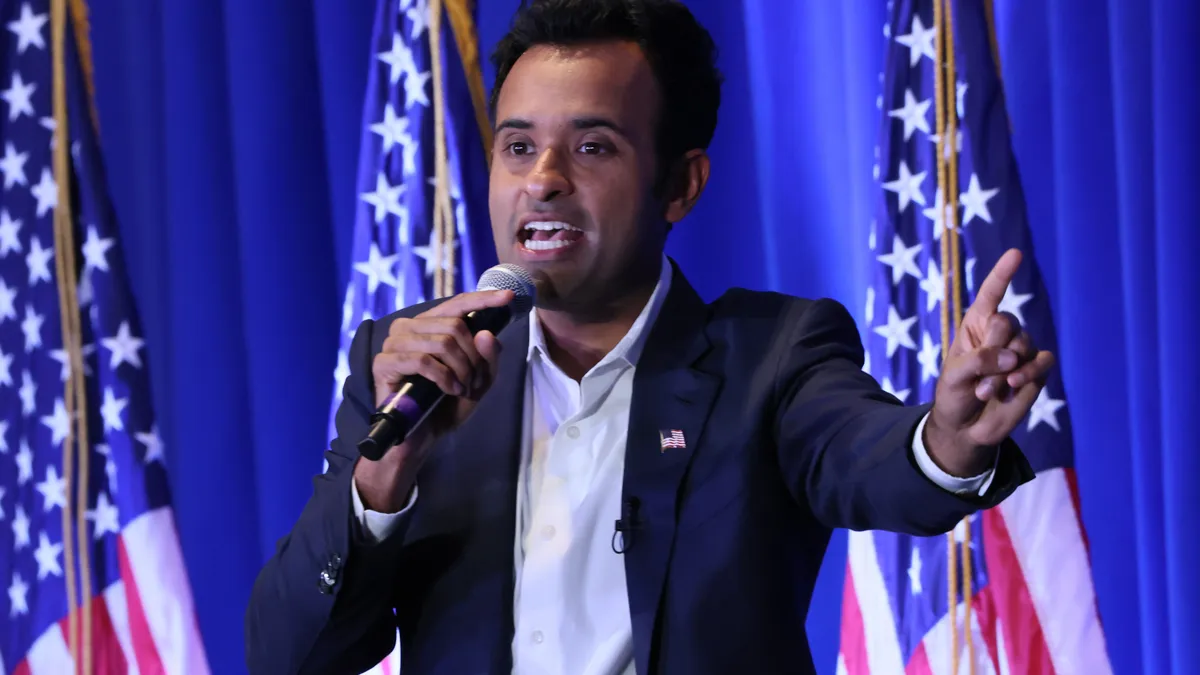Republican presidential candidate and businessmen Vivek Ramaswamy unveiled crypto policy framework on Thursday at the North American Blockchain Summit in Forth Worth, Texas.
Ramaswamy now stands out as the only GOP candidate to include crypto in his political platform after introducing his “Three Freedoms of Crypto” framework.
His three-part plan began with protecting code developers from prosecution if what they create is then used by bad actors. Writing code, Ramaswamy believes, is constitutionally protected.
“It’s my view that code is speech, and while it’s perfectly appropriate for the government to [protect] against bad actors, if you take the Tornado Cash example of going upstream for the actual developers of the code, that’s wrong,” Ramaswamy said in an interview with CoinDesk TV. “You’ve got to draw a distinction between the code itself, which is protected, versus people who misuse it to steal. That’s something that’s not happening today. That’s freedom of speech. Principle No. 1 is the freedom to code.”
Tornado Cash was a cryptocurrency mixer, which obfuscates the origin of funds to make transactions harder to trace.
Tornado Cash’s developers were charged in August with money laundering and sanctions violations due to their work on the mixer. U.S. Attorney Damian Williams said the developers "knowingly facilitated" more than $1 billion in money laundering, and that they “knew that they were helping hackers and fraudsters conceal the fruits of their crimes.”
The second “freedom” in Ramaswamy’s crypto framework is the freedom to financial self-reliance, which would prohibit the federal government from limiting the use of self-hosted wallets and would clarify that the Bank Secrecy Act, which he said has “been weaponized,” doesn’t apply to blockchain infrastructure providers.
The third and final “freedom” of Ramaswamy’s framework is freedom from regulatory overreach, saying that were he to become president, his regime would establish rules to clarify what qualifies as a security and what does not — a still-hot debate between regulators and crypto firms.
“What changes is that regulation by enforcement ends?” Ramaswamy told CoinDesk TV. “What does that mean? That the rules are delineated clearly in advance, rather than you having to wait for an enforcement action for the SEC to figure out whether or not a given coin was a security or not, that Gary Gensler refuses to say today, for example, about Ethereum.”
Regulation by enforcement is the norm for the current SEC, though at least one commissioner doesn’t think regulation should be used that way. SEC Commissioner Hester Peirce said at Money20/20 in October that it would be “better if, as we see things developing … why don’t we go ahead and help people by thinking through some of the issues ahead of time? And I think that would give people who are really just trying to build the technology … it would allow them to just kind of do their thing, understanding the general parameters.”
Ramaswamy said he believes regulators have impeded innovation in the digital asset space.
“The wet blanket on American innovation isn’t even Congress. It’s the regulatory state that’s making up its own rules regardless of the laws that actually exist in this country,” Ramaswamy told CoinDesk TV.
He plans to cut the federal workforce by 75%, and in that plan said he won’t spare the SEC.














